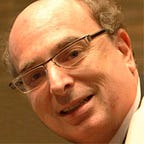It’s common to hit points in our careers, when we have to choose between two or more compelling job options. With creative people who are always “in the process of becoming,” this challenge may be even more pronounced, the potential outcomes more malleable. At times like these, our ability to project ourselves into various scenarios does much more than just give us some anticipatory “job training”. It prepares us to embrace and manage some wild and unpredictable turns.
During one such deciding moment, I found myself thumbing though a cover story entitled, “Gurus of Innovation” in Business Week. Excited by what I read, I sent cold emails to the people featured in the article: David Rockwell, Beth Comstock, and Roger Martin. Miraculously, I heard back from all three companies and followed up by interviewing simultaneously with both Rockwell Group and GE. Roger Martin’s effort, introducing innovation and entrepreneurship to business schools, was also very interesting but less clear as a way forward.
Sliding Door, path 1
One of the first questions Rockwell asked was, “How do you express your ideas?” This was a no-brainer for me, since I’ve been drawing continuously since I was 6 years old. But the next question lurked me into a course correction, “Have you ever designed a parade?” This should have thrown me, since the answer was “no” and I had spent the previous five years in quiet, think-tank-like, technology environments. But instead I answered, “I think I can design a parade,” and described how I often sketch up my wife’s costume designs. And with that, I was in.
The last question I had to grapple with at Rockwell was, “What are you?” This involved Svenja Leggiewie (currently a Director of Experience Insights at J&J), thinking out loud about my role. From her POV, without a business background, I wasn’t a design strategist, and I wasn’t a renderer either. So she labelled me an “Envisioner,” a term they use at Continuum, an innovation design firm in Boston. With that label, my career marched on from designing onscreen applications to designing people’s experiences in the real world.
Sliding Door, path 2
I opted out of a potential job with GE because, well, the Rockwell parade was too exciting to pass up. While it may seem odd, part of me continued to imagine what it would be like if I worked at GE. I followed, read, and marveled at the amazing changes going on there and the role GE has played in the history of American innovation. When I left Rockwell three years later, I reached out again and met with several people at the company. However, GE was focused at the time on building out a large UX team in CA and I didn’t fit easily into that picture. This didn’t stop me from projecting how my strategic design + Rockwell-hatched envisioner skills fit in with what they were doing.
Sliding Door, path 3
While I spoke with Roger Martin’s organization, there was no real follow up. But again, nothing was lost by having this innovation/business sub-routine running in the background. A couple of years later, Bob Coyne, my former colleague at AT&T Labs Research said that a Innovation Entrepreneurship program was launching at Columbia University. We decided it was the right time to start a business with WordsEye, a technology Bob had been developing for several years. So, while Sliding Door, path 3 wasn’t executed as originally envisioned, it did lead to immersion in the kind of program Roger Martin envisioned, and most surprisingly my new trajectory, serving for four years as CEO of a technology startup.
The upshot is: there are no accidents where curiosity and passion are concerned. As Shakespeare would say, “They will out!” I didn’t know that picking up that Business Week issue would open and close opportunities, and become a roadmap for how my career would unfold. I think Joseph Campbell sums this up nicely in quoting Schopenhauer, the German philosopher, in his “The Power of Myth” book: “When you…look back over your lifetime, it can seem to have had a consistent order and plan, as though composed by some novelist. Events that when they occurred had seemed accidental and of little moment turn out to have been indispensable factors in the composition of a consistent plot.” Campbell goes on to say, “Schopenhauer suggests that just as your dreams are composed by an aspect of yourself of which your consciousness is unaware, so, too, your whole life is composed by the will within you.”
